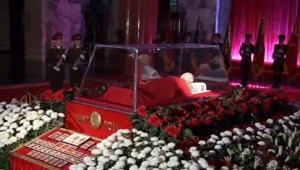History loves irony, as Prof. Gingrich could (and no doubt will) tell us. Two men renowned for their deeds die more or less on the same day on opposite sides of the world. The bad guy gets the big headline, the good guy makes the front page one last time as a footnote to the times.
Kim Jong-Il, the pudgy maximum leader of the Hermit Kingdom, will now share a grave in a gaudy memorial in downtown Pyongyang with evil aplenty, and the ghosts of many thousands of his countrymen whom he starved and otherwise brutalized into early death.

Kim, a Michelin Man in a badly tailored leisure suit on elevator shoes with big hair that looked as if he trimmed it with a chain saw, never missed a session at the dinner table while his subjects were left to survive on thin soup of bark stripped from scrawny trees. Kim, who was 69 at his death, looked more like an unemployed circus clown than the aging supremo of an emerging nuclear state.
Thousands of miles away, Vaclav Havel, the man regarded as “the dissident soul of the Czechs” died at 75 at his country home in northern Bohemia, mourned as the principled man who eloquently articulated the moral power of the poor and powerless. Shy and sometimes polite to a fault, the acclaimed author of plays was a man who walked the walk, spending five years in Communist prisons and emerging to inspire a counterrevolution that toppled an evil empire.
Kim Jong-Un would be the Great Young ‘Un, as his grandfather was “Great Leader” and his father “Dear Leader”.
Mr. Havel is mourned quietly as the author of “the Velvet Revolution” that liberated the millions on the wrong side of the Berlin Wall, which itself was leveled by the forces of light that Mr. Havel set against the Soviet legions. The mourning for Kim Jong-Il smelled more like the cheaply manufactured stuff.
Chinese state-run television networks showed videos of hundreds of North Koreans flooding into the streets to weep under the direction of cops of various kind. North Korea’s official news agency reported that people in the streets were “writhing in pain” from the loss of the man who succeeded his father, Kim Il-Sung, “the Great Leader” who by fiat is “the eternal president” of North Korea. Synthetic immortality is all that accompanies a despot dispatched to justice in what Sen. John McCain calls “a warm corner of hell.”
Kim Jong-Un, Kim Jong-Il’s favored young’un, the officially designated successor, is the only source of solace for the weeping millions in North Korea. “We have esteemed Comrade Kim Jong-Un,” the state news agency reported. North Koreans from all walks of life “are in utter despair but finding comfort in the absolute surety that the leadership of [the young’un] will lead and succeed the great task of revolutionary enterprise.”
He has a hard act to follow. The newly dead Kim was quite a bit of piecework. His teachers insisted that as a child he taught them more than they taught him. “He is a challenge for a teacher,” one of his professors told me when I visited North Korea several years ago. “There is nothing that he does not already know.” When he took up golf, Kim shot four – or maybe it was five – holes-in-one on his first round. He modestly promised to do better when he grew accustomed to the game.
But Kim Jong-Il and his regime did one thing well. They kept the Hermit Kingdom insulated from the outside world, so efficiently done that when I was there with four colleagues from The Washington Times we were astonished to discover how little the North Koreans we met knew of that outside world. Many had not heard that a man had walked on the moon.
Kim Jong-Un, who would be the Great Young’un in the tradition of his grandfather (the Great Leader) and his father (the Dear Leader), won’t have much time to establish himself as the Great Intellect or the Great Duffer. The North Korean generals probably have other ideas about who should rise to the top of the Great Ant Heap. The generals may have concluded that since both George W. Bush and Barack Obama have demonstrated they have no appetite for getting tough with Pyongyang they can push the young’un aside and consolidate a military dictatorship free to make mischief at home or abroad.
If there’s a Vaclav Havel waiting in the wings, no one has seen him. The outside world is right to be wary and, like the Koreans in Seoul, on high alert.
Wesley Pruden is editor emeritus of The Washington Times.

